Mental Illness: Client Perspective, Recovery Principles, and Services
VerifiedAdded on 2022/10/12
|10
|2160
|353
Report
AI Summary
This report provides a comprehensive overview of mental illness, encompassing its diverse range of symptoms and the impact it has on individuals, families, and communities. It explores mental illness from a client-centered perspective, highlighting the economic, emotional, and social consequences, including the potential for family disruption and the importance of caregiver support. The report then outlines the principles of recovery, emphasizing hope, culture, respect, strengths, peer support, and relationships, and discusses consumer participation in treatment. Furthermore, the report details community services available in Victoria, including emergency departments, transport services, and clinical guidelines, while also referencing the Mental Health Act 2009 and community treatment orders. The conclusion reinforces the importance of proper treatment and recovery-oriented approaches in managing mental health issues.
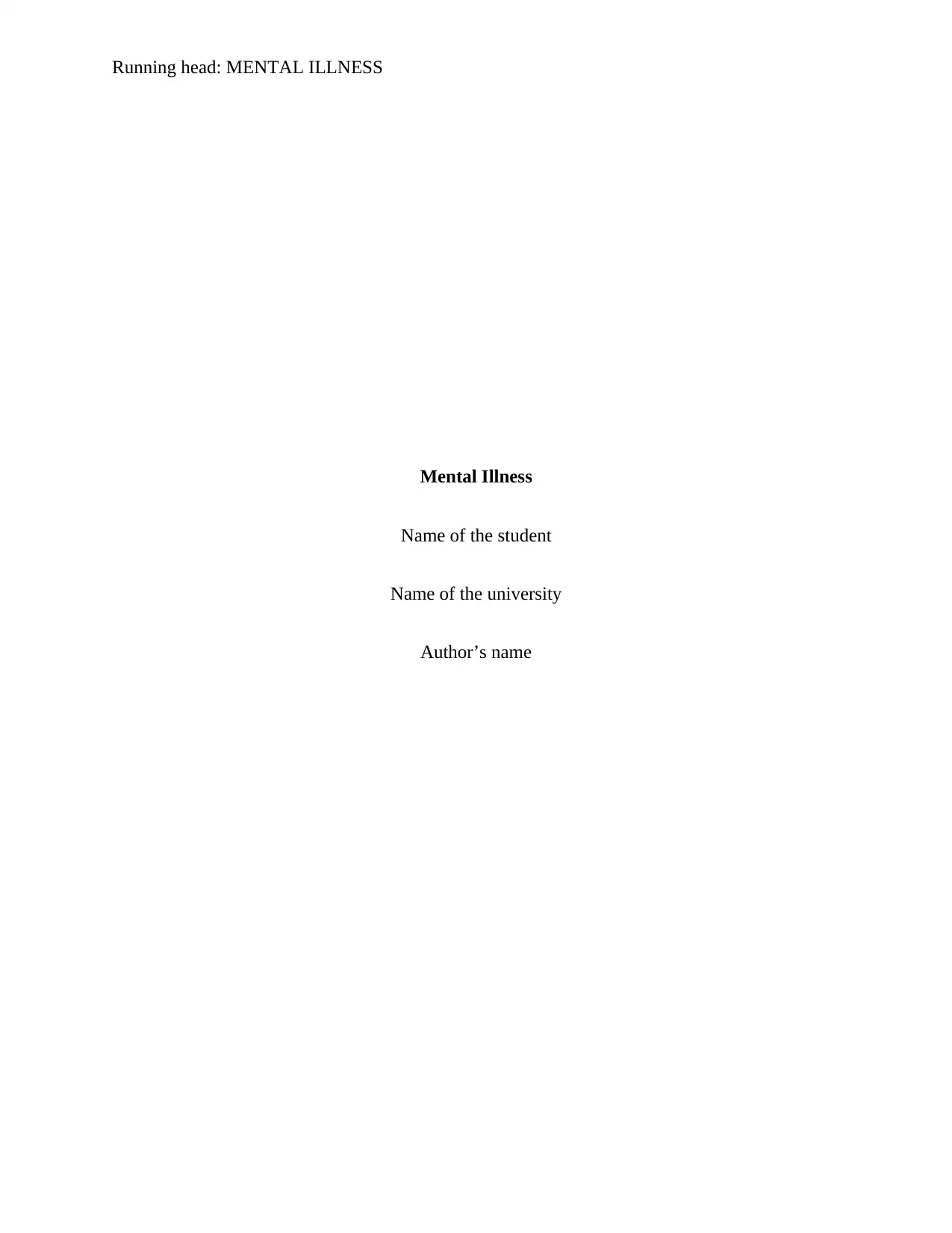
Running head: MENTAL ILLNESS
Mental Illness
Name of the student
Name of the university
Author’s name
Mental Illness
Name of the student
Name of the university
Author’s name
Paraphrase This Document
Need a fresh take? Get an instant paraphrase of this document with our AI Paraphraser
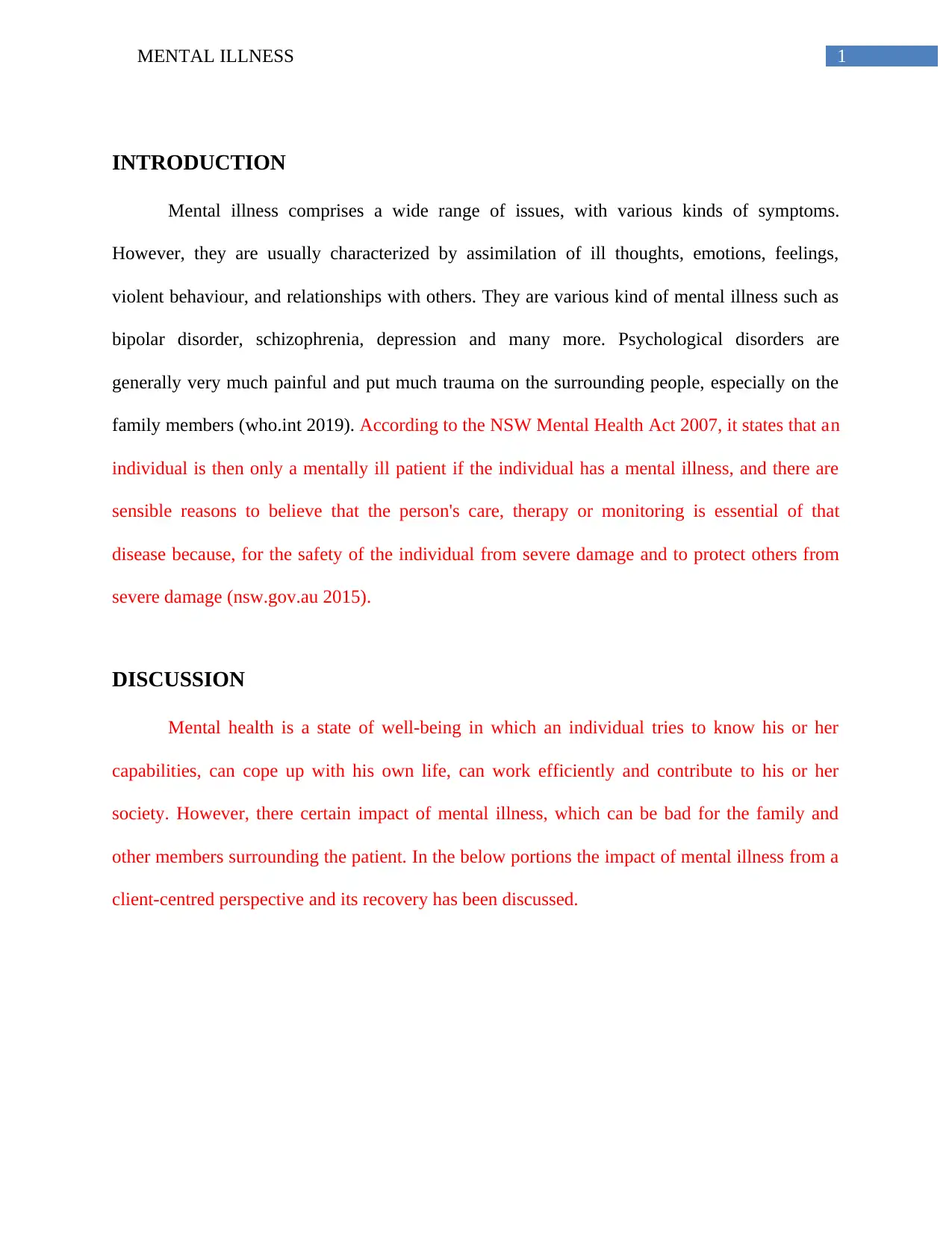
1MENTAL ILLNESS
INTRODUCTION
Mental illness comprises a wide range of issues, with various kinds of symptoms.
However, they are usually characterized by assimilation of ill thoughts, emotions, feelings,
violent behaviour, and relationships with others. They are various kind of mental illness such as
bipolar disorder, schizophrenia, depression and many more. Psychological disorders are
generally very much painful and put much trauma on the surrounding people, especially on the
family members (who.int 2019). According to the NSW Mental Health Act 2007, it states that an
individual is then only a mentally ill patient if the individual has a mental illness, and there are
sensible reasons to believe that the person's care, therapy or monitoring is essential of that
disease because, for the safety of the individual from severe damage and to protect others from
severe damage (nsw.gov.au 2015).
DISCUSSION
Mental health is a state of well-being in which an individual tries to know his or her
capabilities, can cope up with his own life, can work efficiently and contribute to his or her
society. However, there certain impact of mental illness, which can be bad for the family and
other members surrounding the patient. In the below portions the impact of mental illness from a
client-centred perspective and its recovery has been discussed.
INTRODUCTION
Mental illness comprises a wide range of issues, with various kinds of symptoms.
However, they are usually characterized by assimilation of ill thoughts, emotions, feelings,
violent behaviour, and relationships with others. They are various kind of mental illness such as
bipolar disorder, schizophrenia, depression and many more. Psychological disorders are
generally very much painful and put much trauma on the surrounding people, especially on the
family members (who.int 2019). According to the NSW Mental Health Act 2007, it states that an
individual is then only a mentally ill patient if the individual has a mental illness, and there are
sensible reasons to believe that the person's care, therapy or monitoring is essential of that
disease because, for the safety of the individual from severe damage and to protect others from
severe damage (nsw.gov.au 2015).
DISCUSSION
Mental health is a state of well-being in which an individual tries to know his or her
capabilities, can cope up with his own life, can work efficiently and contribute to his or her
society. However, there certain impact of mental illness, which can be bad for the family and
other members surrounding the patient. In the below portions the impact of mental illness from a
client-centred perspective and its recovery has been discussed.
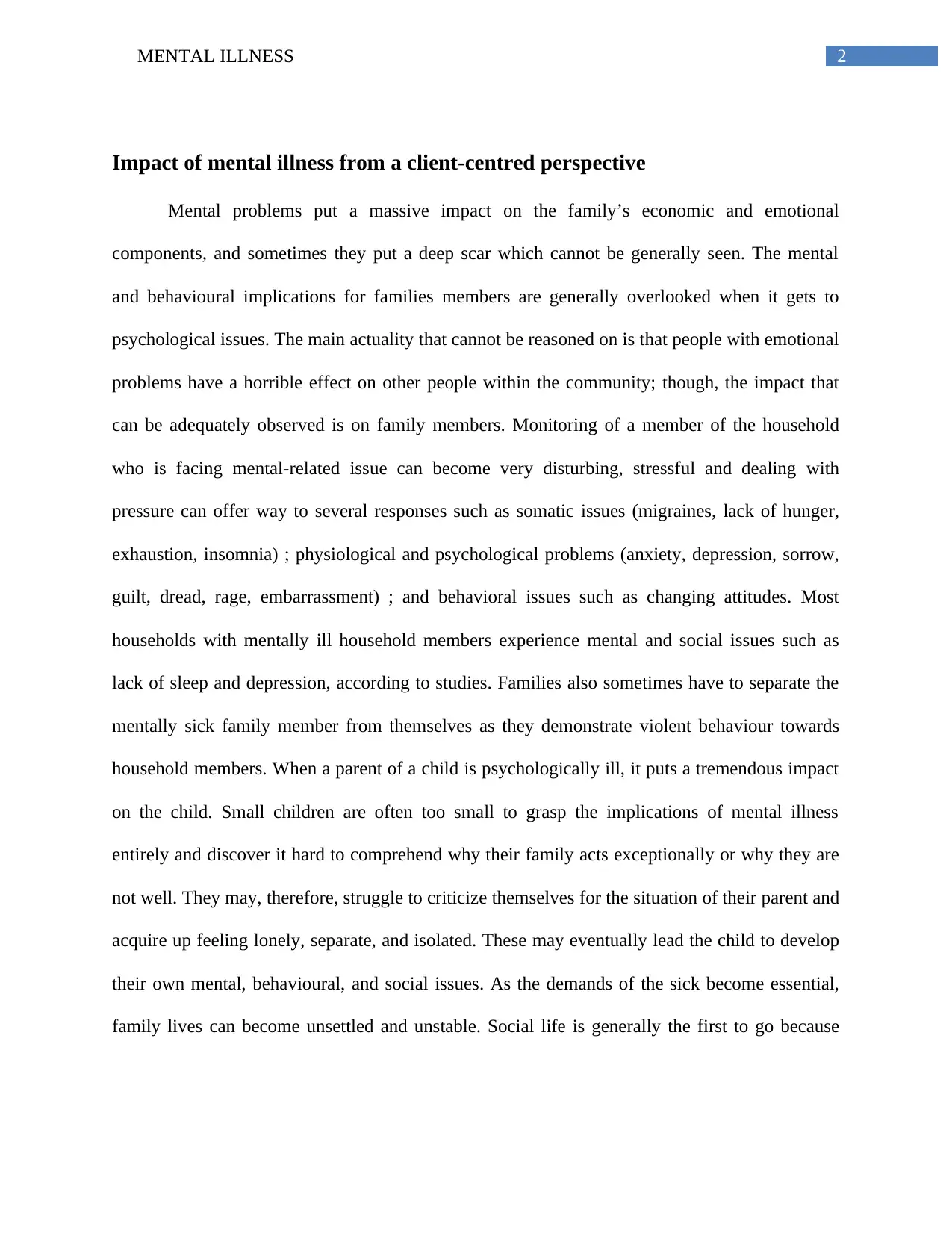
2MENTAL ILLNESS
Impact of mental illness from a client-centred perspective
Mental problems put a massive impact on the family’s economic and emotional
components, and sometimes they put a deep scar which cannot be generally seen. The mental
and behavioural implications for families members are generally overlooked when it gets to
psychological issues. The main actuality that cannot be reasoned on is that people with emotional
problems have a horrible effect on other people within the community; though, the impact that
can be adequately observed is on family members. Monitoring of a member of the household
who is facing mental-related issue can become very disturbing, stressful and dealing with
pressure can offer way to several responses such as somatic issues (migraines, lack of hunger,
exhaustion, insomnia) ; physiological and psychological problems (anxiety, depression, sorrow,
guilt, dread, rage, embarrassment) ; and behavioral issues such as changing attitudes. Most
households with mentally ill household members experience mental and social issues such as
lack of sleep and depression, according to studies. Families also sometimes have to separate the
mentally sick family member from themselves as they demonstrate violent behaviour towards
household members. When a parent of a child is psychologically ill, it puts a tremendous impact
on the child. Small children are often too small to grasp the implications of mental illness
entirely and discover it hard to comprehend why their family acts exceptionally or why they are
not well. They may, therefore, struggle to criticize themselves for the situation of their parent and
acquire up feeling lonely, separate, and isolated. These may eventually lead the child to develop
their own mental, behavioural, and social issues. As the demands of the sick become essential,
family lives can become unsettled and unstable. Social life is generally the first to go because
Impact of mental illness from a client-centred perspective
Mental problems put a massive impact on the family’s economic and emotional
components, and sometimes they put a deep scar which cannot be generally seen. The mental
and behavioural implications for families members are generally overlooked when it gets to
psychological issues. The main actuality that cannot be reasoned on is that people with emotional
problems have a horrible effect on other people within the community; though, the impact that
can be adequately observed is on family members. Monitoring of a member of the household
who is facing mental-related issue can become very disturbing, stressful and dealing with
pressure can offer way to several responses such as somatic issues (migraines, lack of hunger,
exhaustion, insomnia) ; physiological and psychological problems (anxiety, depression, sorrow,
guilt, dread, rage, embarrassment) ; and behavioral issues such as changing attitudes. Most
households with mentally ill household members experience mental and social issues such as
lack of sleep and depression, according to studies. Families also sometimes have to separate the
mentally sick family member from themselves as they demonstrate violent behaviour towards
household members. When a parent of a child is psychologically ill, it puts a tremendous impact
on the child. Small children are often too small to grasp the implications of mental illness
entirely and discover it hard to comprehend why their family acts exceptionally or why they are
not well. They may, therefore, struggle to criticize themselves for the situation of their parent and
acquire up feeling lonely, separate, and isolated. These may eventually lead the child to develop
their own mental, behavioural, and social issues. As the demands of the sick become essential,
family lives can become unsettled and unstable. Social life is generally the first to go because
⊘ This is a preview!⊘
Do you want full access?
Subscribe today to unlock all pages.

Trusted by 1+ million students worldwide
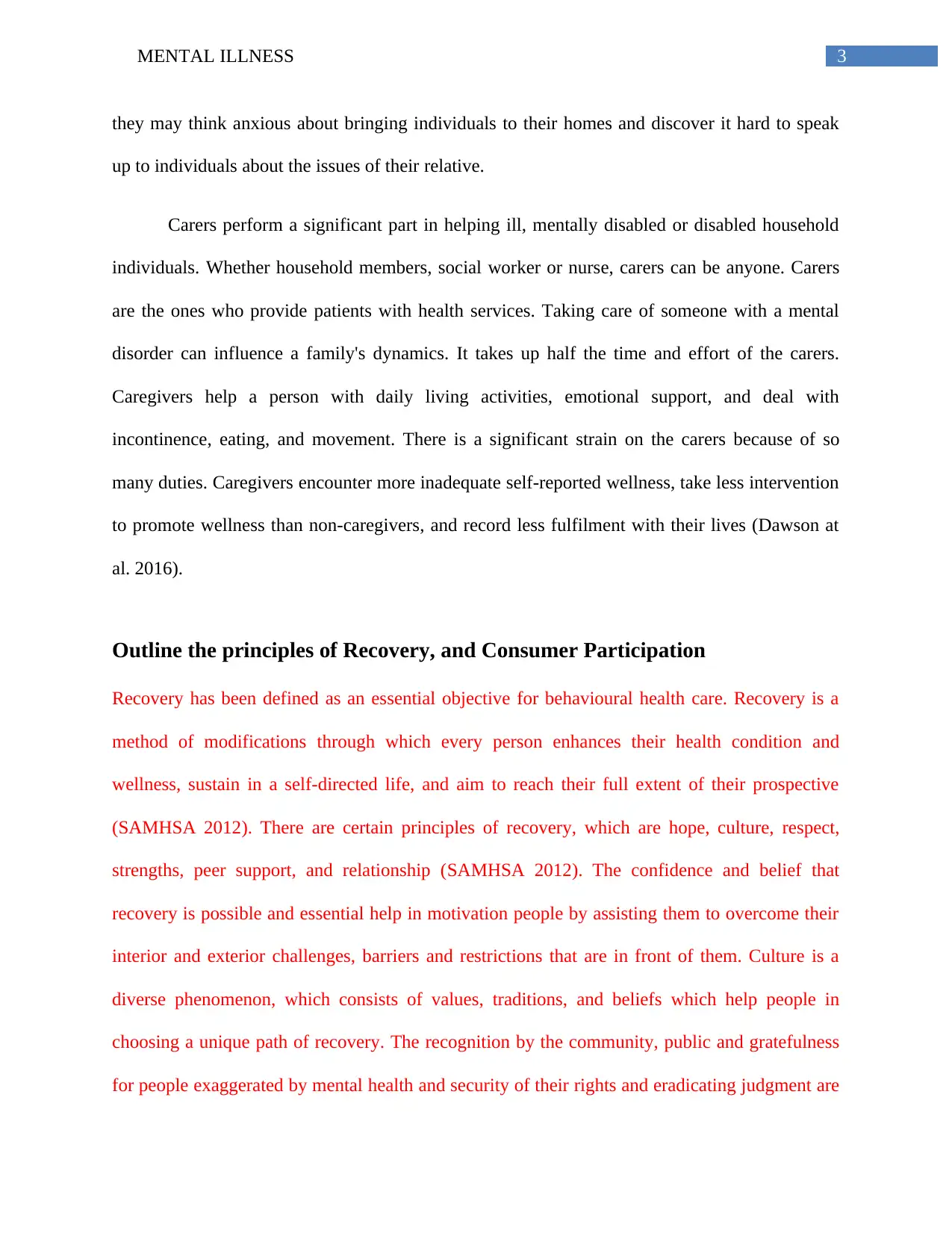
3MENTAL ILLNESS
they may think anxious about bringing individuals to their homes and discover it hard to speak
up to individuals about the issues of their relative.
Carers perform a significant part in helping ill, mentally disabled or disabled household
individuals. Whether household members, social worker or nurse, carers can be anyone. Carers
are the ones who provide patients with health services. Taking care of someone with a mental
disorder can influence a family's dynamics. It takes up half the time and effort of the carers.
Caregivers help a person with daily living activities, emotional support, and deal with
incontinence, eating, and movement. There is a significant strain on the carers because of so
many duties. Caregivers encounter more inadequate self-reported wellness, take less intervention
to promote wellness than non-caregivers, and record less fulfilment with their lives (Dawson at
al. 2016).
Outline the principles of Recovery, and Consumer Participation
Recovery has been defined as an essential objective for behavioural health care. Recovery is a
method of modifications through which every person enhances their health condition and
wellness, sustain in a self-directed life, and aim to reach their full extent of their prospective
(SAMHSA 2012). There are certain principles of recovery, which are hope, culture, respect,
strengths, peer support, and relationship (SAMHSA 2012). The confidence and belief that
recovery is possible and essential help in motivation people by assisting them to overcome their
interior and exterior challenges, barriers and restrictions that are in front of them. Culture is a
diverse phenomenon, which consists of values, traditions, and beliefs which help people in
choosing a unique path of recovery. The recognition by the community, public and gratefulness
for people exaggerated by mental health and security of their rights and eradicating judgment are
they may think anxious about bringing individuals to their homes and discover it hard to speak
up to individuals about the issues of their relative.
Carers perform a significant part in helping ill, mentally disabled or disabled household
individuals. Whether household members, social worker or nurse, carers can be anyone. Carers
are the ones who provide patients with health services. Taking care of someone with a mental
disorder can influence a family's dynamics. It takes up half the time and effort of the carers.
Caregivers help a person with daily living activities, emotional support, and deal with
incontinence, eating, and movement. There is a significant strain on the carers because of so
many duties. Caregivers encounter more inadequate self-reported wellness, take less intervention
to promote wellness than non-caregivers, and record less fulfilment with their lives (Dawson at
al. 2016).
Outline the principles of Recovery, and Consumer Participation
Recovery has been defined as an essential objective for behavioural health care. Recovery is a
method of modifications through which every person enhances their health condition and
wellness, sustain in a self-directed life, and aim to reach their full extent of their prospective
(SAMHSA 2012). There are certain principles of recovery, which are hope, culture, respect,
strengths, peer support, and relationship (SAMHSA 2012). The confidence and belief that
recovery is possible and essential help in motivation people by assisting them to overcome their
interior and exterior challenges, barriers and restrictions that are in front of them. Culture is a
diverse phenomenon, which consists of values, traditions, and beliefs which help people in
choosing a unique path of recovery. The recognition by the community, public and gratefulness
for people exaggerated by mental health and security of their rights and eradicating judgment are
Paraphrase This Document
Need a fresh take? Get an instant paraphrase of this document with our AI Paraphraser
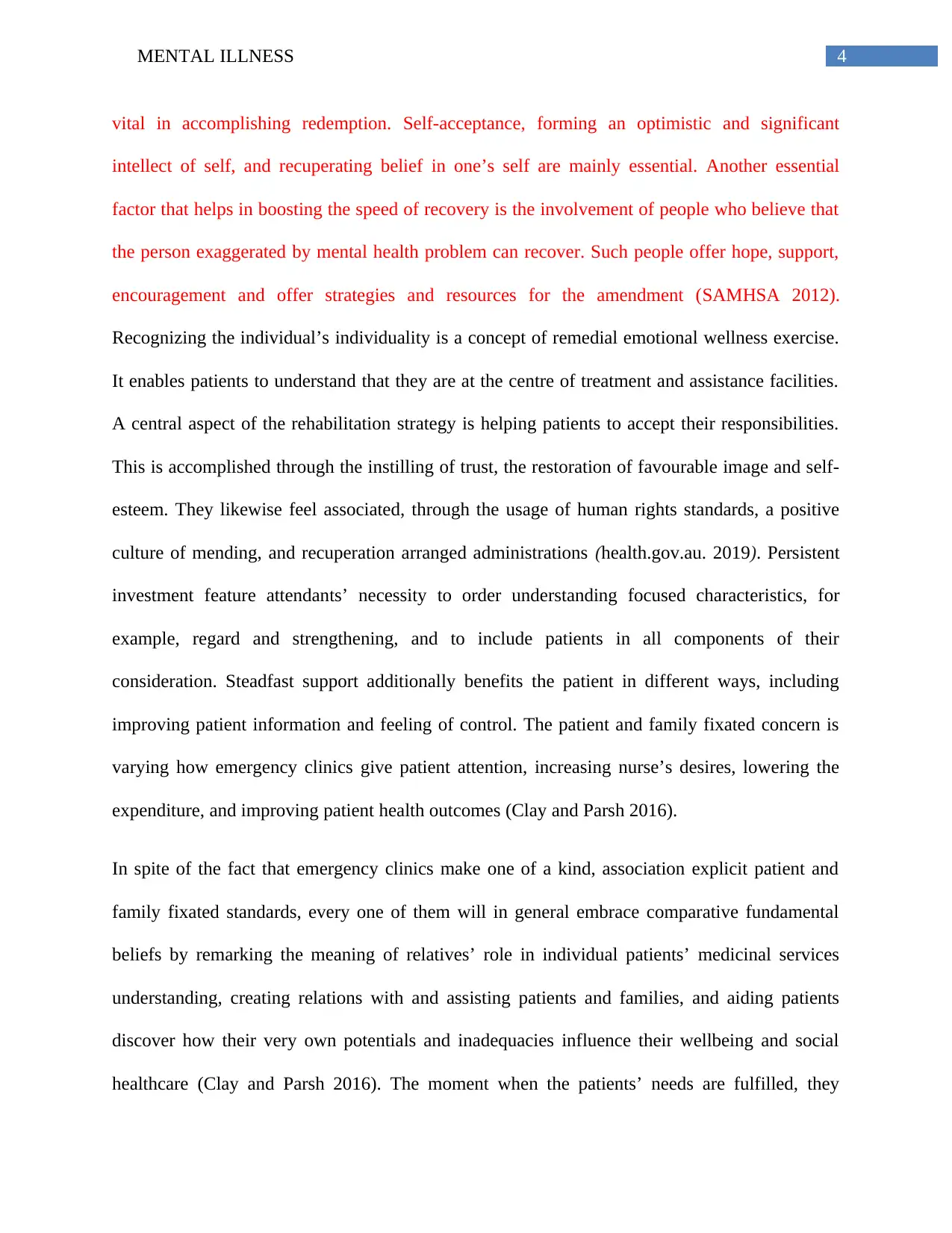
4MENTAL ILLNESS
vital in accomplishing redemption. Self-acceptance, forming an optimistic and significant
intellect of self, and recuperating belief in one’s self are mainly essential. Another essential
factor that helps in boosting the speed of recovery is the involvement of people who believe that
the person exaggerated by mental health problem can recover. Such people offer hope, support,
encouragement and offer strategies and resources for the amendment (SAMHSA 2012).
Recognizing the individual’s individuality is a concept of remedial emotional wellness exercise.
It enables patients to understand that they are at the centre of treatment and assistance facilities.
A central aspect of the rehabilitation strategy is helping patients to accept their responsibilities.
This is accomplished through the instilling of trust, the restoration of favourable image and self-
esteem. They likewise feel associated, through the usage of human rights standards, a positive
culture of mending, and recuperation arranged administrations (health.gov.au. 2019). Persistent
investment feature attendants’ necessity to order understanding focused characteristics, for
example, regard and strengthening, and to include patients in all components of their
consideration. Steadfast support additionally benefits the patient in different ways, including
improving patient information and feeling of control. The patient and family fixated concern is
varying how emergency clinics give patient attention, increasing nurse’s desires, lowering the
expenditure, and improving patient health outcomes (Clay and Parsh 2016).
In spite of the fact that emergency clinics make one of a kind, association explicit patient and
family fixated standards, every one of them will in general embrace comparative fundamental
beliefs by remarking the meaning of relatives’ role in individual patients’ medicinal services
understanding, creating relations with and assisting patients and families, and aiding patients
discover how their very own potentials and inadequacies influence their wellbeing and social
healthcare (Clay and Parsh 2016). The moment when the patients’ needs are fulfilled, they
vital in accomplishing redemption. Self-acceptance, forming an optimistic and significant
intellect of self, and recuperating belief in one’s self are mainly essential. Another essential
factor that helps in boosting the speed of recovery is the involvement of people who believe that
the person exaggerated by mental health problem can recover. Such people offer hope, support,
encouragement and offer strategies and resources for the amendment (SAMHSA 2012).
Recognizing the individual’s individuality is a concept of remedial emotional wellness exercise.
It enables patients to understand that they are at the centre of treatment and assistance facilities.
A central aspect of the rehabilitation strategy is helping patients to accept their responsibilities.
This is accomplished through the instilling of trust, the restoration of favourable image and self-
esteem. They likewise feel associated, through the usage of human rights standards, a positive
culture of mending, and recuperation arranged administrations (health.gov.au. 2019). Persistent
investment feature attendants’ necessity to order understanding focused characteristics, for
example, regard and strengthening, and to include patients in all components of their
consideration. Steadfast support additionally benefits the patient in different ways, including
improving patient information and feeling of control. The patient and family fixated concern is
varying how emergency clinics give patient attention, increasing nurse’s desires, lowering the
expenditure, and improving patient health outcomes (Clay and Parsh 2016).
In spite of the fact that emergency clinics make one of a kind, association explicit patient and
family fixated standards, every one of them will in general embrace comparative fundamental
beliefs by remarking the meaning of relatives’ role in individual patients’ medicinal services
understanding, creating relations with and assisting patients and families, and aiding patients
discover how their very own potentials and inadequacies influence their wellbeing and social
healthcare (Clay and Parsh 2016). The moment when the patients’ needs are fulfilled, they
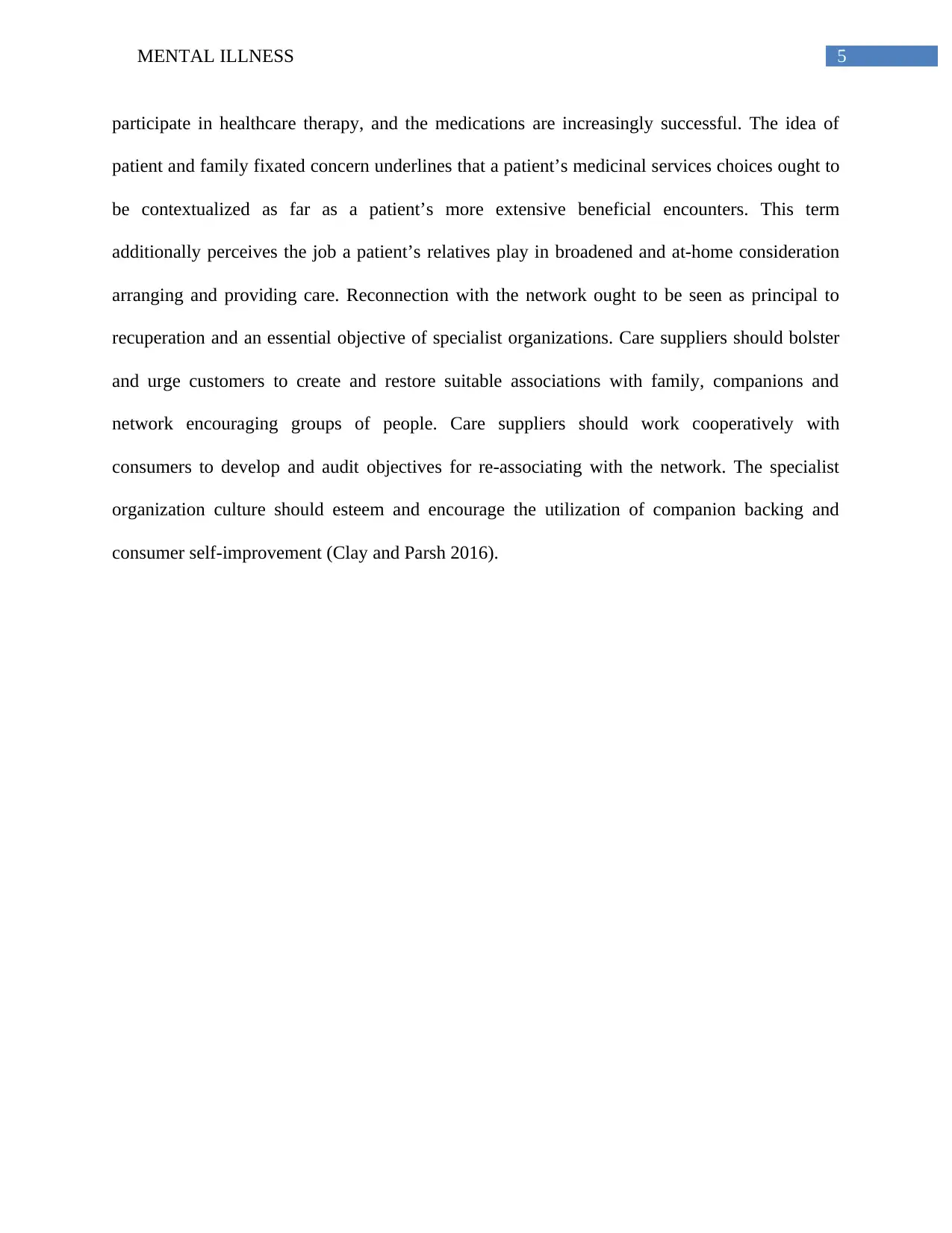
5MENTAL ILLNESS
participate in healthcare therapy, and the medications are increasingly successful. The idea of
patient and family fixated concern underlines that a patient’s medicinal services choices ought to
be contextualized as far as a patient’s more extensive beneficial encounters. This term
additionally perceives the job a patient’s relatives play in broadened and at-home consideration
arranging and providing care. Reconnection with the network ought to be seen as principal to
recuperation and an essential objective of specialist organizations. Care suppliers should bolster
and urge customers to create and restore suitable associations with family, companions and
network encouraging groups of people. Care suppliers should work cooperatively with
consumers to develop and audit objectives for re-associating with the network. The specialist
organization culture should esteem and encourage the utilization of companion backing and
consumer self-improvement (Clay and Parsh 2016).
participate in healthcare therapy, and the medications are increasingly successful. The idea of
patient and family fixated concern underlines that a patient’s medicinal services choices ought to
be contextualized as far as a patient’s more extensive beneficial encounters. This term
additionally perceives the job a patient’s relatives play in broadened and at-home consideration
arranging and providing care. Reconnection with the network ought to be seen as principal to
recuperation and an essential objective of specialist organizations. Care suppliers should bolster
and urge customers to create and restore suitable associations with family, companions and
network encouraging groups of people. Care suppliers should work cooperatively with
consumers to develop and audit objectives for re-associating with the network. The specialist
organization culture should esteem and encourage the utilization of companion backing and
consumer self-improvement (Clay and Parsh 2016).
⊘ This is a preview!⊘
Do you want full access?
Subscribe today to unlock all pages.

Trusted by 1+ million students worldwide
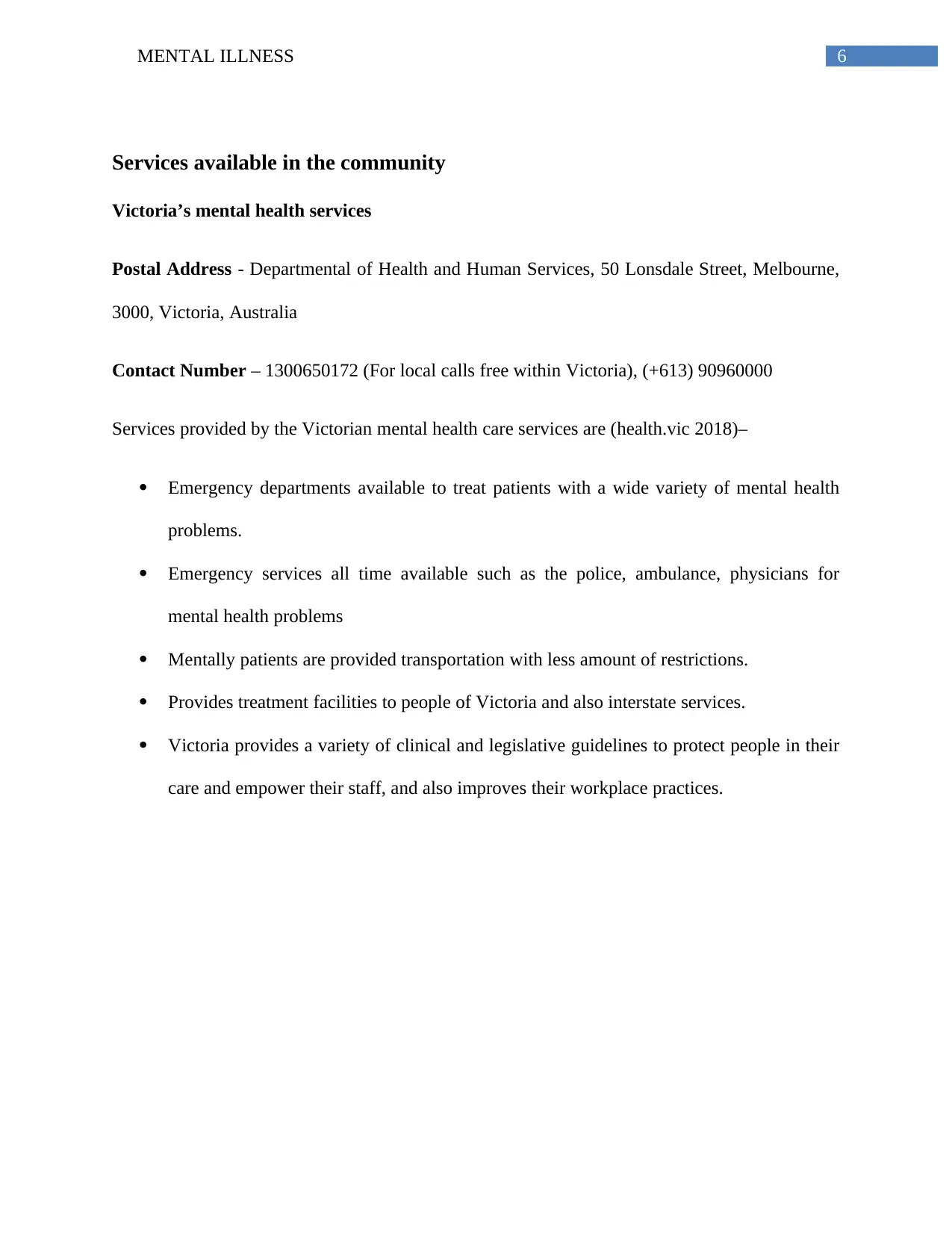
6MENTAL ILLNESS
Services available in the community
Victoria’s mental health services
Postal Address - Departmental of Health and Human Services, 50 Lonsdale Street, Melbourne,
3000, Victoria, Australia
Contact Number – 1300650172 (For local calls free within Victoria), (+613) 90960000
Services provided by the Victorian mental health care services are (health.vic 2018)–
Emergency departments available to treat patients with a wide variety of mental health
problems.
Emergency services all time available such as the police, ambulance, physicians for
mental health problems
Mentally patients are provided transportation with less amount of restrictions.
Provides treatment facilities to people of Victoria and also interstate services.
Victoria provides a variety of clinical and legislative guidelines to protect people in their
care and empower their staff, and also improves their workplace practices.
Services available in the community
Victoria’s mental health services
Postal Address - Departmental of Health and Human Services, 50 Lonsdale Street, Melbourne,
3000, Victoria, Australia
Contact Number – 1300650172 (For local calls free within Victoria), (+613) 90960000
Services provided by the Victorian mental health care services are (health.vic 2018)–
Emergency departments available to treat patients with a wide variety of mental health
problems.
Emergency services all time available such as the police, ambulance, physicians for
mental health problems
Mentally patients are provided transportation with less amount of restrictions.
Provides treatment facilities to people of Victoria and also interstate services.
Victoria provides a variety of clinical and legislative guidelines to protect people in their
care and empower their staff, and also improves their workplace practices.
Paraphrase This Document
Need a fresh take? Get an instant paraphrase of this document with our AI Paraphraser
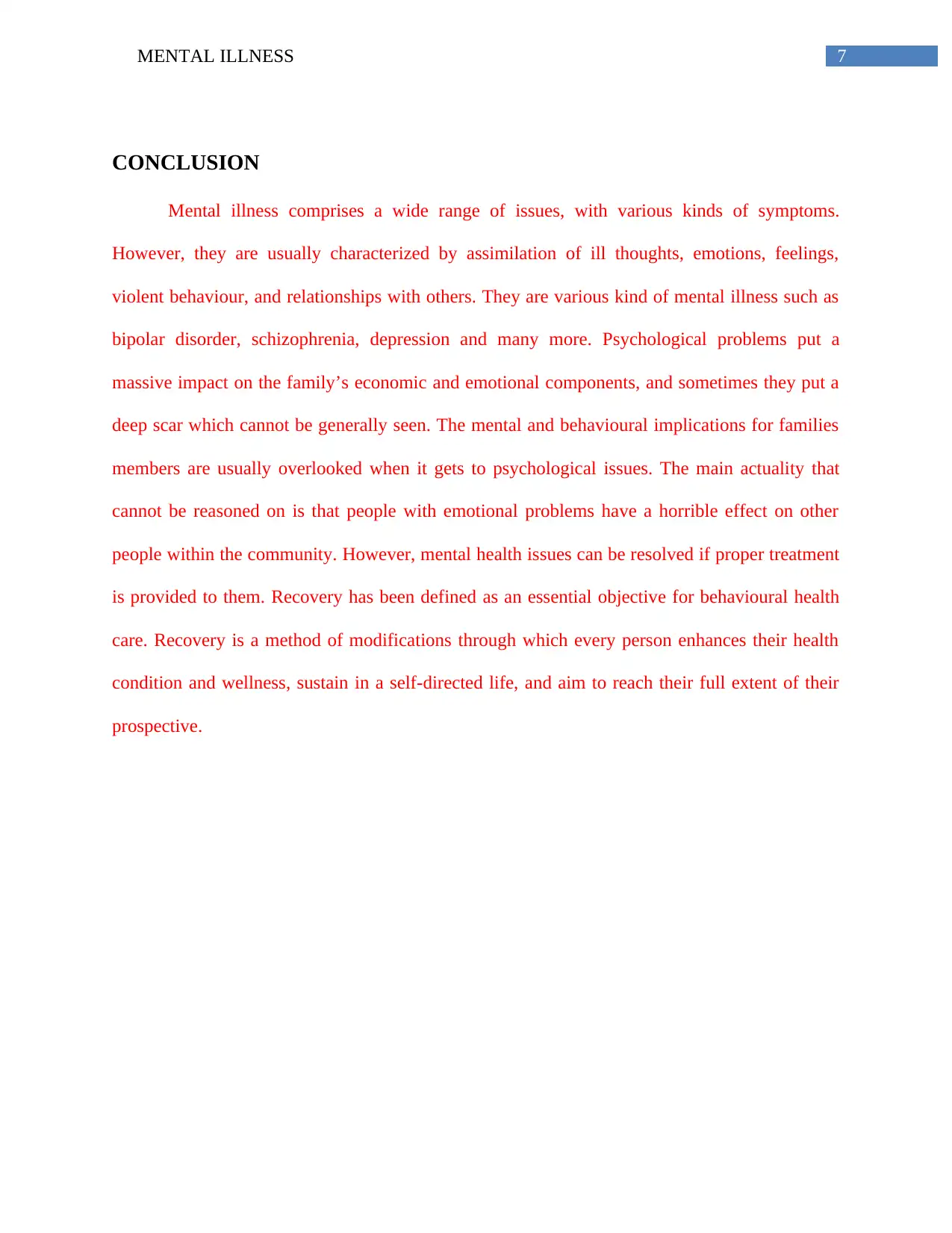
7MENTAL ILLNESS
CONCLUSION
Mental illness comprises a wide range of issues, with various kinds of symptoms.
However, they are usually characterized by assimilation of ill thoughts, emotions, feelings,
violent behaviour, and relationships with others. They are various kind of mental illness such as
bipolar disorder, schizophrenia, depression and many more. Psychological problems put a
massive impact on the family’s economic and emotional components, and sometimes they put a
deep scar which cannot be generally seen. The mental and behavioural implications for families
members are usually overlooked when it gets to psychological issues. The main actuality that
cannot be reasoned on is that people with emotional problems have a horrible effect on other
people within the community. However, mental health issues can be resolved if proper treatment
is provided to them. Recovery has been defined as an essential objective for behavioural health
care. Recovery is a method of modifications through which every person enhances their health
condition and wellness, sustain in a self-directed life, and aim to reach their full extent of their
prospective.
CONCLUSION
Mental illness comprises a wide range of issues, with various kinds of symptoms.
However, they are usually characterized by assimilation of ill thoughts, emotions, feelings,
violent behaviour, and relationships with others. They are various kind of mental illness such as
bipolar disorder, schizophrenia, depression and many more. Psychological problems put a
massive impact on the family’s economic and emotional components, and sometimes they put a
deep scar which cannot be generally seen. The mental and behavioural implications for families
members are usually overlooked when it gets to psychological issues. The main actuality that
cannot be reasoned on is that people with emotional problems have a horrible effect on other
people within the community. However, mental health issues can be resolved if proper treatment
is provided to them. Recovery has been defined as an essential objective for behavioural health
care. Recovery is a method of modifications through which every person enhances their health
condition and wellness, sustain in a self-directed life, and aim to reach their full extent of their
prospective.
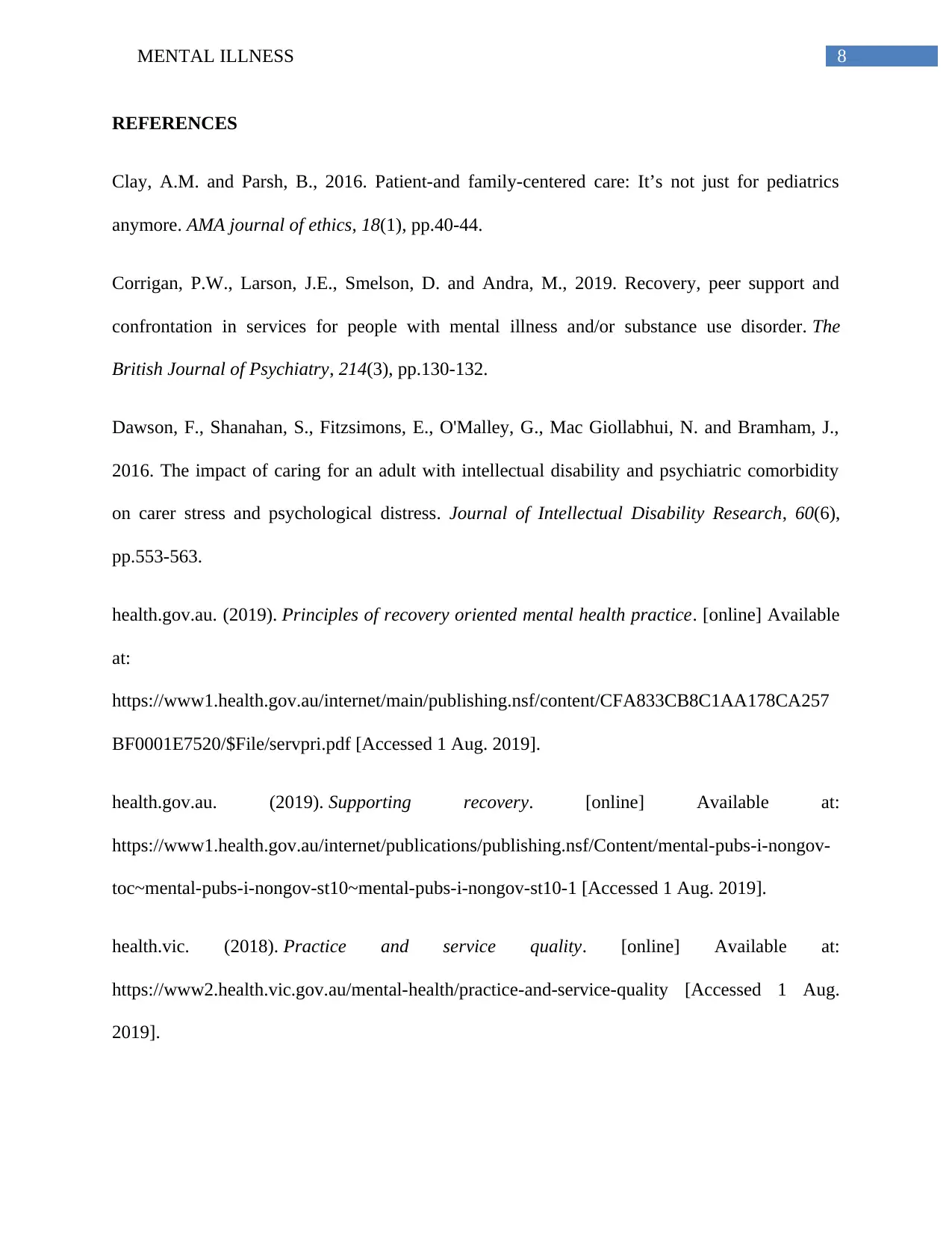
8MENTAL ILLNESS
REFERENCES
Clay, A.M. and Parsh, B., 2016. Patient-and family-centered care: It’s not just for pediatrics
anymore. AMA journal of ethics, 18(1), pp.40-44.
Corrigan, P.W., Larson, J.E., Smelson, D. and Andra, M., 2019. Recovery, peer support and
confrontation in services for people with mental illness and/or substance use disorder. The
British Journal of Psychiatry, 214(3), pp.130-132.
Dawson, F., Shanahan, S., Fitzsimons, E., O'Malley, G., Mac Giollabhui, N. and Bramham, J.,
2016. The impact of caring for an adult with intellectual disability and psychiatric comorbidity
on carer stress and psychological distress. Journal of Intellectual Disability Research, 60(6),
pp.553-563.
health.gov.au. (2019). Principles of recovery oriented mental health practice. [online] Available
at:
https://www1.health.gov.au/internet/main/publishing.nsf/content/CFA833CB8C1AA178CA257
BF0001E7520/$File/servpri.pdf [Accessed 1 Aug. 2019].
health.gov.au. (2019). Supporting recovery. [online] Available at:
https://www1.health.gov.au/internet/publications/publishing.nsf/Content/mental-pubs-i-nongov-
toc~mental-pubs-i-nongov-st10~mental-pubs-i-nongov-st10-1 [Accessed 1 Aug. 2019].
health.vic. (2018). Practice and service quality. [online] Available at:
https://www2.health.vic.gov.au/mental-health/practice-and-service-quality [Accessed 1 Aug.
2019].
REFERENCES
Clay, A.M. and Parsh, B., 2016. Patient-and family-centered care: It’s not just for pediatrics
anymore. AMA journal of ethics, 18(1), pp.40-44.
Corrigan, P.W., Larson, J.E., Smelson, D. and Andra, M., 2019. Recovery, peer support and
confrontation in services for people with mental illness and/or substance use disorder. The
British Journal of Psychiatry, 214(3), pp.130-132.
Dawson, F., Shanahan, S., Fitzsimons, E., O'Malley, G., Mac Giollabhui, N. and Bramham, J.,
2016. The impact of caring for an adult with intellectual disability and psychiatric comorbidity
on carer stress and psychological distress. Journal of Intellectual Disability Research, 60(6),
pp.553-563.
health.gov.au. (2019). Principles of recovery oriented mental health practice. [online] Available
at:
https://www1.health.gov.au/internet/main/publishing.nsf/content/CFA833CB8C1AA178CA257
BF0001E7520/$File/servpri.pdf [Accessed 1 Aug. 2019].
health.gov.au. (2019). Supporting recovery. [online] Available at:
https://www1.health.gov.au/internet/publications/publishing.nsf/Content/mental-pubs-i-nongov-
toc~mental-pubs-i-nongov-st10~mental-pubs-i-nongov-st10-1 [Accessed 1 Aug. 2019].
health.vic. (2018). Practice and service quality. [online] Available at:
https://www2.health.vic.gov.au/mental-health/practice-and-service-quality [Accessed 1 Aug.
2019].
⊘ This is a preview!⊘
Do you want full access?
Subscribe today to unlock all pages.

Trusted by 1+ million students worldwide
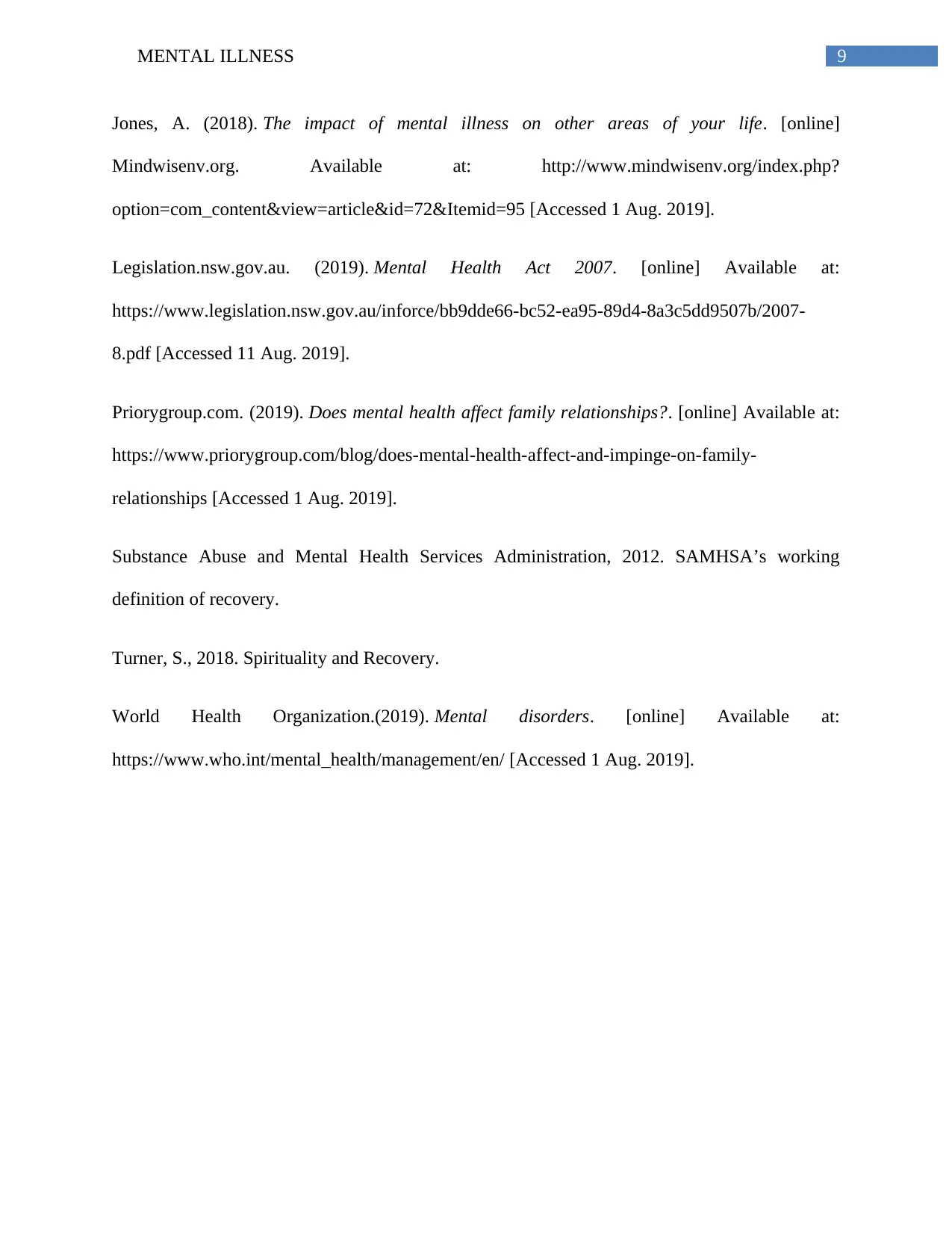
9MENTAL ILLNESS
Jones, A. (2018). The impact of mental illness on other areas of your life. [online]
Mindwisenv.org. Available at: http://www.mindwisenv.org/index.php?
option=com_content&view=article&id=72&Itemid=95 [Accessed 1 Aug. 2019].
Legislation.nsw.gov.au. (2019). Mental Health Act 2007. [online] Available at:
https://www.legislation.nsw.gov.au/inforce/bb9dde66-bc52-ea95-89d4-8a3c5dd9507b/2007-
8.pdf [Accessed 11 Aug. 2019].
Priorygroup.com. (2019). Does mental health affect family relationships?. [online] Available at:
https://www.priorygroup.com/blog/does-mental-health-affect-and-impinge-on-family-
relationships [Accessed 1 Aug. 2019].
Substance Abuse and Mental Health Services Administration, 2012. SAMHSA’s working
definition of recovery.
Turner, S., 2018. Spirituality and Recovery.
World Health Organization.(2019). Mental disorders. [online] Available at:
https://www.who.int/mental_health/management/en/ [Accessed 1 Aug. 2019].
Jones, A. (2018). The impact of mental illness on other areas of your life. [online]
Mindwisenv.org. Available at: http://www.mindwisenv.org/index.php?
option=com_content&view=article&id=72&Itemid=95 [Accessed 1 Aug. 2019].
Legislation.nsw.gov.au. (2019). Mental Health Act 2007. [online] Available at:
https://www.legislation.nsw.gov.au/inforce/bb9dde66-bc52-ea95-89d4-8a3c5dd9507b/2007-
8.pdf [Accessed 11 Aug. 2019].
Priorygroup.com. (2019). Does mental health affect family relationships?. [online] Available at:
https://www.priorygroup.com/blog/does-mental-health-affect-and-impinge-on-family-
relationships [Accessed 1 Aug. 2019].
Substance Abuse and Mental Health Services Administration, 2012. SAMHSA’s working
definition of recovery.
Turner, S., 2018. Spirituality and Recovery.
World Health Organization.(2019). Mental disorders. [online] Available at:
https://www.who.int/mental_health/management/en/ [Accessed 1 Aug. 2019].
1 out of 10
Related Documents
Your All-in-One AI-Powered Toolkit for Academic Success.
+13062052269
info@desklib.com
Available 24*7 on WhatsApp / Email
![[object Object]](/_next/static/media/star-bottom.7253800d.svg)
Unlock your academic potential
Copyright © 2020–2026 A2Z Services. All Rights Reserved. Developed and managed by ZUCOL.




